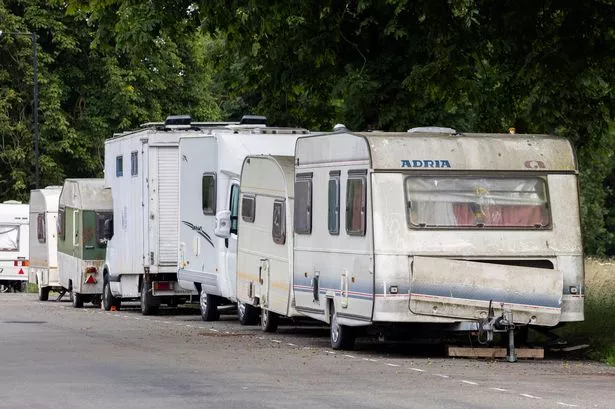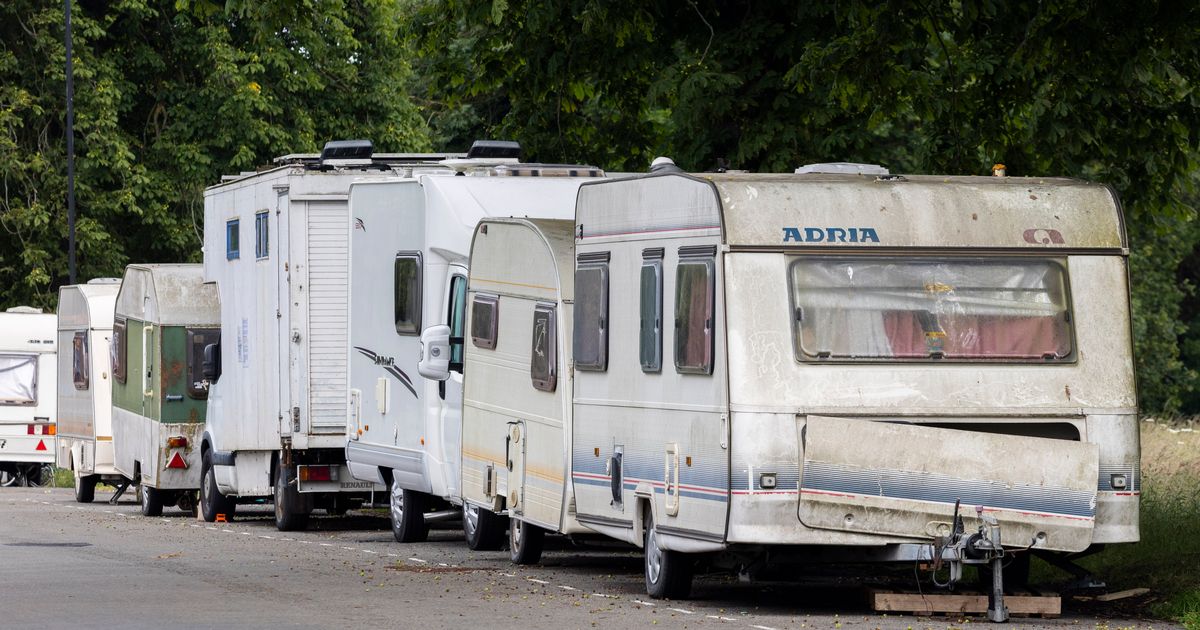The council wants to grow the number from 66 to 250 People living in vans and caravans on the Downs pictured in June 2024 (Image: © SWNS)
People living in vans and caravans on the Downs pictured in June 2024 (Image: © SWNS)
Hundreds of new pitches to vehicle dwellers could be created in Bristol in a bid to tackle the problem. Bristol City Council is aiming to massively increase the number of council-run pitches to 250 from 66 to help resolve crisis gripping the city.
By the end of March next year, the council wants the 250 pitches available across so-called ‘meanwhile sites’ for people to live on.
The council currently has has 66 of the pitches spread across five sites, with a further two sites due to open to bring the total of available pitches to 99. Vehicle dwellers pay a small weekly fee to use the pitches.
Councillor Barry Parsons (Green, Easton), chair of the homes and housing delivery committee, acknowledged it was an ambitious target. “These are places where you can move your vehicle off the street on to a bit of council-owned land with a fence around it for a bit of security, with clean water, with waste facilities, some of the sort of basic things that you need in order to be able to live with with dignity and security,” he said.
“We know that people really appreciate that on the sites that we already provide (and) we want to provide a lot more of them, so we’ve given ourselves a target of 250 pitches across the city by the end of the financial year, so spring next year.” “It’s a really ambitious target, and really, we’ve kind of mobilised people from across the whole council to try and get there.”
There are currently over 600 vehicles being inhabited by people across Bristol with the council refuting claims the city is the van-dwelling capital of the UK. The vast majority, 480, of those vans are parked on kerbside sites around the city.
New policy launched
The council had announced its goal of a fourfold increase in the number of temporary sites available to vehicle dwellers in July, with the confirmed timeframe for the new sites coming as it prepares to launch a public consultation later today (September 11) on its new vehicle dwelling policy. The number of people living in vehicles in the city has risen by over three hundred per cent since 2019.
“Vehicle dweller numbers have grown in recent years, across Bristol and the whole country, and we are clear we cannot go on like this,” Cllr Parsons said. “Our communities, including vehicle dwellers themselves, deserve better. This increase in people living in vehicles creates a range of social, public health, and environmental challenges for the city and people living this way.”
The council has written to the government in a bid to secure increased resources to try to solve the issue of vehicle dwelling in the city. With Labour in turmoil amid former Housing Minister Angela Rayner’s resignation last week, the government has yet to respond.
As part of the proposed new policy, council officers will continue to take a support-first approach towards van dwellers. The council is proposing a three-month period where, after a new van dwelling site is identified, officers work with people living there to try to move them to a meanwhile site or provide them with a pathway to alternative housing.
Enforcement to move the vehicles along will only occur if, at the end of the three months, there has been no engagement with council officers, or if there is a more immediate risk caused by the presence of vans in a particular area.
“We’re not apologetic about the fact that we are prioritising support,” Cllr Parsons said. “Because, you know, at the end of the day, these are our fellow citizens.”
“These are people in Bristol who are just trying to get by and, like with everybody else in the city, we need to make sure that we’re working in a way that’s respectful, that promotes inclusion, that gives people an opportunity to sort of participate in the life of the city.”
Enforcement a last resort
Immediate enforcement measures will only be considered in situations where the presence of vehicle dwellers has a ‘serious impact’ on the local community, environment, or location. Some possible serious impact scenarios include obstruction of a highway, or evidence of antisocial behaviour.
Another scenario which could be considered high-impact under the proposed new policy is if a vehicle dwelling site is located next to a school or public park. Much of the increasingly fraught debate over vehicle dwelling in Bristol this year has been centred on a large community of around 100 vehicles based around The Downs.
The council has received an injunction which allows it to move vehicles along which are parked on the grass of the Downs, and on busy through roads, but has been limited in its ability to do anything about the vehicles lining the outer edges of the parkland. Councillor Parsons said the issue was bigger than one area.
“The long term, big picture stuff is really where it’s at, that’s the stuff that really is going to make a difference to people on the Downs and elsewhere in the city,” he said. “Because it is, we think, going to be the stuff that means that we do actually see a sort of sustainable reduction in the number of vehicles parked up around the city.”
“We think it’s really important as well, that we treat it as a city wide issue, and that we don’t focus solely on the Downs. There’s a lot of noise and there’s a lot of pressure on us to really kind of focus on the Downs, you know, as the only place but actually, most people who live in a vehicle in Bristol don’t live on the Downs.”
Space needed for temporary sites
In a bid to free up space for meanwhile sites, the council has done a “sweep” of all of its existing land to identify potential new locations and a dedicated planning officer is responsible for assessing applications once new sites are identified. The council is also imploring private landholders who could have suitable space for temporary sites to come forward.
Tom Gilchrist, Head of Service for Private Housing, Accessible Homes and Travellers, said landowners could benefit from offering their space for temporary sites, as well as vehicle dwellers and the council.
“Our experience of using meanwhile sites is if you’ve got vacant land in the city, there is a likelihood it’s going to be trespassed,” he said. “You’re going to have flight tipping, you’re going to have anti-social behaviour and various other activities you wouldn’t want on those sites.”
“If you’re the landowner, we have found in the past when we’ve created a meanwhile site (that) actually having somebody in occupation looking after (and) maintaining the site reduces significantly the amount of fly tipping, anti-social behaviour, drug dealing that may be going on in and around those sites. So in effect, if private sites come forward, the users of the site will be providing security for free.”
Consultation on the council’s new policy will be active from 10.30am on Thursday September 11. The new policy will go before a council committee on December 19.
